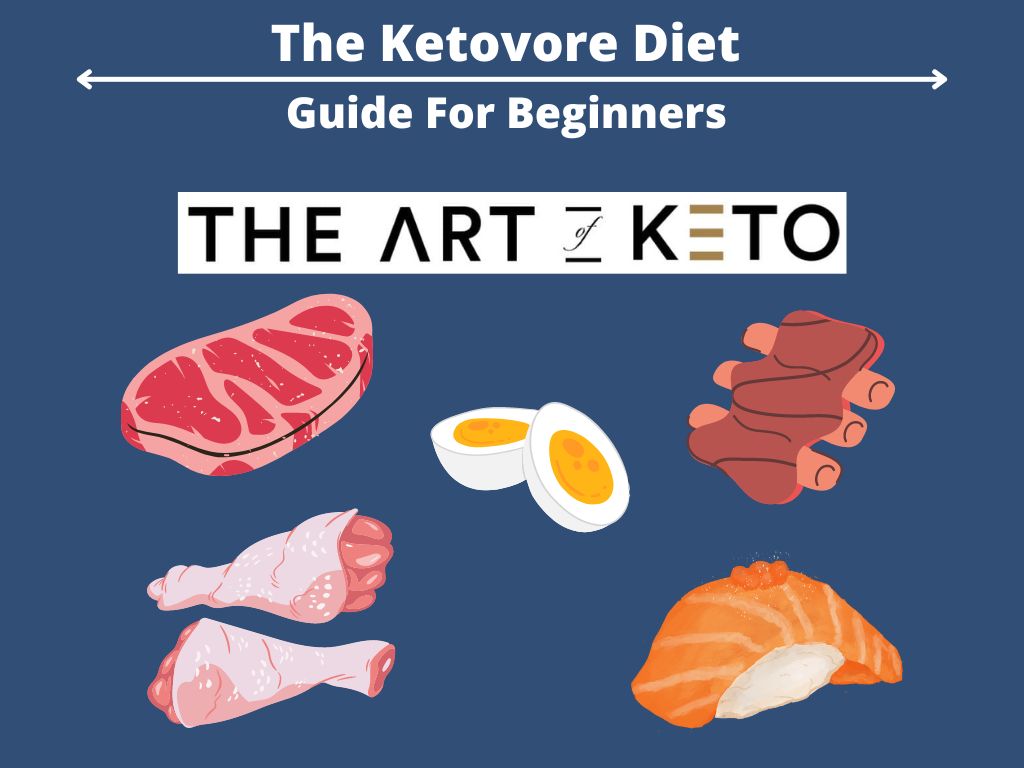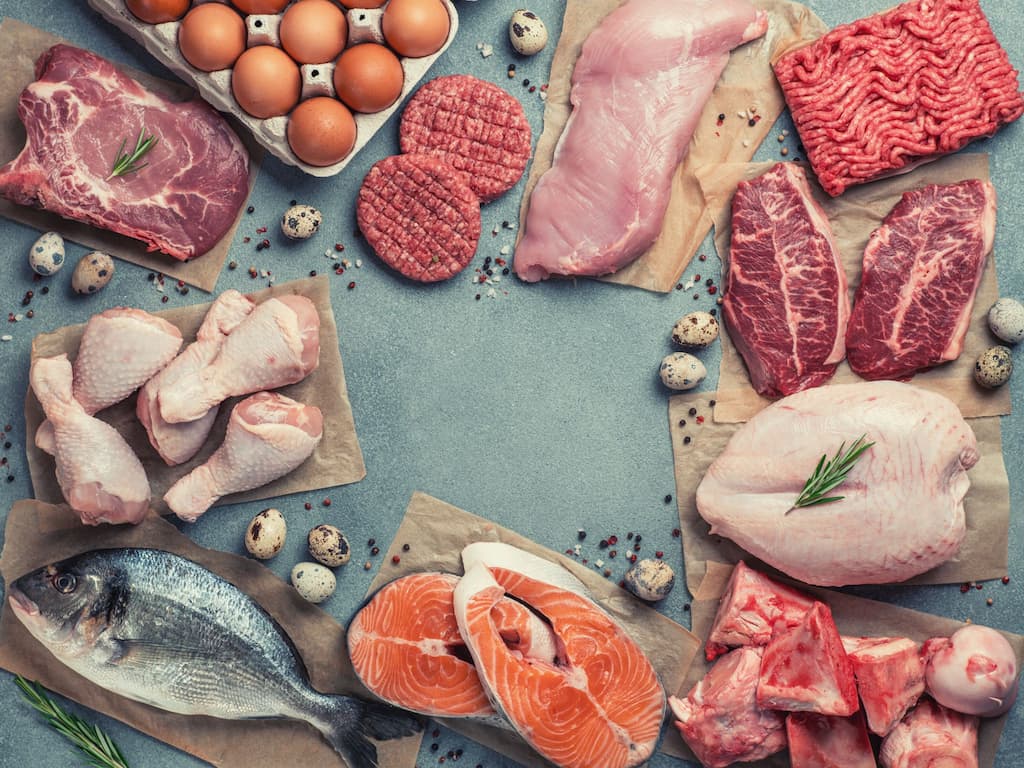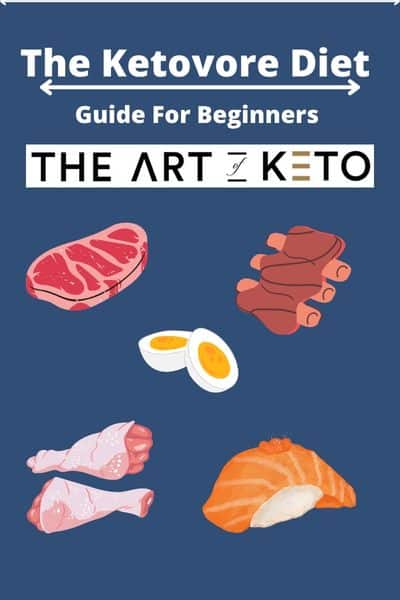Hey there, foodies and health enthusiasts! Are you looking for a diet that can help you shed those stubborn pounds and improve your overall health? Look no further than the ketovore diet!
Now, you may wonder, “What is ketovore?” Quite simply, it's a high-fat, low-carb diet that centers around consuming animal products while avoiding carbohydrates and plant-based foods. But there's a bit of a twist to it compared to other popular low-carb diets like keto or paleo.

The Ketovore Diet is trending recently because of its unique approach to nutrition. While many people confuse it with the carnivore diet, it wasn't until recently that it gained a dedicated following and became a well-known eating pattern.
But what exactly is the Ketovore Diet, and what makes it different from other diets out there? That's what we're here to explore in this article. We'll take a closer look at the history and basics of the Ketovore Diet, the benefits and potential risks of the diet, and provide tips and recipes to help you get started.
So, whether you're a seasoned low-carb dieter or just looking to try something new, keep reading to discover everything you need to know about the Ketovore Diet!
- What is the Ketovore Diet?
- How to Start a Ketovore Diet
- A. Preparing your body for ketosis
- B. Foods to eat on the Ketovore diet
- C. Foods to avoid on the Ketovore Diet
- D. Tips for sticking to the Ketovore diet
- Ketovore Recipes
- Potential Health Risks of the Ketovore Diet
- Risks associated with a high-fat, low-carb diet
- Monitoring your health on the ketovore diet
- Long-term effects of the ketovore diet
- Success Stories and Testimonials
- Conclusion
What is the Ketovore Diet?
The Ketovore Diet is a variation of the popular ketogenic diet, which prioritizes animal-based foods while reducing or excluding plant-based foods. The main objective of this diet is to achieve a state of ketosis. Under ketosis, the body will burn fat stores for energy instead of carbohydrates.
Unlike the traditional ketogenic diet, which emphasizes consuming high amounts of healthy fats, moderate protein, and low carbohydrates, the Ketovore Diet focuses on the consumption of animal products. Plant-based foods such as fruits, vegetables, and grains are limited or removed from the diet.
One of the key differences between the ketovore diet and other diets is the emphasis on animal-based foods. Proponents of the diet argue that animal-based foods are more nutrient-dense and provide a wider range of essential vitamins and minerals than plant-based foods. Some ketovore dieters also find animal-based foods more satiating and claim that they can lead to greater weight loss and improved metabolic health.
Another key difference is the restriction of plant-based foods. Many plant-based foods are high in anti-nutrients, such as lectins, phytates, and oxalates, which can interfere with nutrient absorption and cause digestive issues. By limiting or eliminating these foods, the body can absorb nutrients better and experience improved digestive health.
The Ketovore Diet has amazing health benefits like weight loss, improved metabolic health, increased energy, improved mental clarity, and better digestion. Additionally, ketovote dieters argue that it can help reduce inflammation, improve insulin sensitivity, and significantly decrease the risk of chronic diseases such as type 2 diabetes and heart disease.
How to Start a Ketovore Diet
If you're interested in trying out the ketovore diet, there’s a few things you need to know! Here's a step-by-step guide on how to start a ketovore diet:

A. Preparing your body for ketosis
Before starting the Ketovore Diet, it's important to prepare your body for the shift from burning carbohydrates for energy to burning fat. This process can take anywhere from a few days to a few weeks, depending on your body and previous diet. Here are a few things you can do to prepare your body for ketosis:
- Gradually reduce your carbohydrate intake. Start by gradually reducing your carbohydrate intake over the course of a few weeks. This will give your body time to adjust and help prevent any potential side effects.
- Increase your healthy fat intake. Since the Ketovore Diet is high in healthy fats, it's important to start incorporating more healthy fats into your diet.
- Stay hydrated. Drinking plenty of water is important when transitioning to a Ketovore Diet, as it can help prevent dehydration and potential side effects such as headaches and fatigue.
B. Foods to eat on the Ketovore diet
The ketovore diet emphasizes the consumption of animal-based foods, so it's important to choose high-quality, nutrient-dense sources of protein and fats. Here are some foods to include in your Ketovore Diet:
- Meat: beef, pork, lamb, chicken, turkey, and wild game meats.
- Fish and seafood: salmon, mackerel, sardines, shrimp, crab, and lobster.
- Eggs: choose pasture-raised and organic eggs when possible.
- Dairy: full-fat cheese, butter, cream, and sour cream.
- Fats: coconut oil, avocado oil, olive oil, ghee, and tallow.
- Low-carb vegetables: spinach, kale, broccoli, cauliflower, and cabbage.
C. Foods to avoid on the Ketovore Diet
To stay in a state of ketosis and reap the benefits of the ketovore diet, it's important to limit or avoid high-carbohydrate plant-based foods. Here are some foods to avoid on the Ketovore Diet:
- Grains: wheat, rice, oats, and barley.
- Legumes: beans, lentils, and chickpeas.
- Fruits: apples, bananas, oranges, and grapes.
- Starchy vegetables: potatoes, sweet potatoes, and carrots.
- Processed foods: anything high in sugar, refined grains, or artificial ingredients.
D. Tips for sticking to the Ketovore diet
Like any diet, the Ketovore Diet can be challenging to stick to in the long term. Here are a few tips to help you stay on track:
- Plan your meals ahead of time. This can help you stay disciplined and prevent you from reaching for unhealthy options when you're short on time.
- Keep high-fat snacks on hand. This can help you stay satiated and prevent cravings.
- Experiment with new recipes. The Ketovore Diet may be restrictive, but there's still a lot of food to enjoy
- Be patient. The transition to the Ketovore Diet can be challenging, but it's important to be patient and give your body time to adjust. Over time, you may find that you have more energy, improved mental clarity, and better overall health.
Ketovore Recipes
The Ketovore Diet is a unique approach to the ketogenic diet, focusing mainly on animal-based products, so the meals and snacks you choose to consume should contain high-quality protein and healthy fats. Here are some examples of Ketovore Diet meals and snacks:
- Breakfast: Bacon and eggs cooked in butter, topped with avocado and cheese.
- Lunch: A grilled chicken breast with a side of steamed broccoli and a dollop of sour cream.
- Dinner: Pan-fried salmon with garlic and lemon, served with a side of roasted Brussels sprouts and buttery cauliflower mash.
- Snacks: Deviled eggs, beef jerky, or a handful of nuts and seeds.
Tips for meal prepping on the ketovore diet
Meal prepping is an excellent way to stay on track with the Ketovore Diet, especially when you have a busy schedule. Here are some tips for successful meal prepping on the Ketovore Diet:

- Plan your meals in advance. Take some time each week to plan your meals, so you know exactly what you'll be eating.
- Cook in bulk. Cook large portions of meat, vegetables, and healthy fats so you have plenty of leftovers for the week.
- Invest in high-quality containers. Invest in glass containers with tight-fitting lids, so you can easily store and reheat your meals.
- Use a slow cooker or Instant Pot. These appliances are excellent for batch cooking and require minimal prep work.
- Prep snacks in advance. Prepare snack-sized portions of nuts, seeds, and jerky so you have healthy options on hand when hunger strikes.
Ketovore-friendly restaurants and fast food options
Eating out can be a challenge on the Ketovore Diet, but with a little bit of research, it's possible to find Ketovore-friendly restaurants and fast food options. Here are some ideas:
- Fast food: At many fast food chains, you can order a burger without the bun or a salad with plenty of meat and healthy fats.
- Restaurants: Look for steak or seafood restaurants that offer plenty of Ketovore-friendly options.
- Grocery stores: Many grocery stores now offer pre-packaged Ketovore-friendly meals and snacks, such as pre-cooked meats and hard-boiled eggs.
- Meal delivery services: There are now many meal delivery services that cater specifically to the Ketovore Diet, offering a variety of animal-based meals and snacks.
- BYO options: If you're unsure whether a restaurant or fast food chain has Ketovore-friendly options, consider bringing your own snacks or ordering sides of meat and vegetables to create your own custom meal.
Potential Health Risks of the Ketovore Diet
While the ketovore diet can offer many potential health benefits, it's important to understand the possible health risks associated with a high-fat, low-carb diet.
Risks associated with a high-fat, low-carb diet
- Nutrient deficiencies: Cutting out entire food groups, such as fruits, grains, and legumes, can lead to nutrient deficiencies. It's important to make sure you're getting enough vitamins and minerals from animal-based sources, such as organ meats, seafood, and leafy greens.
- Constipation: The Ketovore Diet is low in fiber, which can lead to constipation. It's essential to eat plenty of low-carb, high-fiber vegetables to keep your digestive system moving.
- Increased risk of heart disease: A diet high in saturated fat can increase your risk of heart disease, especially if you have other risk factors such as high blood pressure or a family history of heart disease.
- Kidney stones: A high-protein diet can increase your risk of developing kidney stones. It's important to drink plenty of water and consume healthy fats to prevent this risk.
Monitoring your health on the ketovore diet
To minimize the risks associated with the Ketovore Diet, it's important to monitor your health regularly. Here are some tips:
- Get regular check-ups with your healthcare provider to monitor your cholesterol, blood pressure, and kidney function.
- Stay hydrated by drinking plenty of water, herbal tea, and bone broth.
- Monitor your electrolyte levels by consuming electrolyte-rich foods or supplements.
- Track your macronutrient intake so you know you're getting enough protein, fat, and carbs to meet your nutritional needs.
Long-term effects of the ketovore diet
While there is limited research on the long-term effects of the Ketovore Diet, it's important to consider the potential risks associated with following a high-fat, low-carb diet for an extended period. Some potential long-term effects include:
- Increased risk of nutrient deficiencies and bone loss.
- Increased risk of heart disease and other chronic health conditions.
- Reduced athletic performance due to low glycogen stores.
- Mental health concerns, such as mood swings and brain fog.
It's essential to discuss any dietary changes with your healthcare provider, especially if you have pre-existing health conditions or concerns. They can help you make informed decisions about the best way to meet your nutritional needs while minimizing your risk of developing health complications.
Success Stories and Testimonials
There are many success stories and testimonials from people who have tried the Ketovore Diet. Here are a few examples:
- Dr. Shawn Baker: Dr. Baker is a proponent of the Ketovore Diet and has been following it since 2016. He has written books and given lectures on the benefits of a high-meat diet.
- Mikhaila Peterson: Peterson is a blogger and YouTuber who has been following a meat-only diet for several years. She credits the Ketovore Diet with helping her overcome chronic autoimmune and mental health issues.
- Amber O'Hearn: O'Hearn is a writer and speaker who has been following a Ketovore Diet for over a decade. She has written extensively about the benefits of a high-fat, low-carb diet.
Benefits of Ketovore Diet
People who have tried the ketovore diet report many benefits, including:

- Weight loss: The Ketovore Diet can help you lose weight by reducing your appetite and increasing fat burning.
- Increased energy: By reducing your reliance on carbs for energy, the Ketovore Diet can help you feel more energized throughout the day.
- Improved mental clarity: Many people report improved mental clarity and focus while following a Ketovore Diet.
- Better sleep: By stabilizing your blood sugar levels and reducing inflammation, the Ketovore Diet can help you get a better night's sleep.
- Improved digestion: Some people report improved digestion and gut health while following a Ketovore Diet.
Challenges for Ketovore Dieters
While many people have found success with the ketovore diet, there can be challenges to following a high-fat, low-carb diet. Here are a few examples of challenges people have faced and how they overcame them:
- Carb cravings: Some people experience carb cravings when they first start a Ketovore Diet. To overcome this, they may increase their fat intake, focus on consuming nutrient-dense foods or incorporate low-carb treats.
- Social situations: Following a Ketovore Diet can be challenging in social situations, such as going out to eat or attending parties. To overcome this, people may choose to bring their own food or plan ahead by looking at menus ahead of time.
- Nutrient deficiencies: As mentioned earlier, nutrient deficiencies can be a risk on the Ketovore Diet. To overcome this, people may need to be mindful of their nutrient intake and supplement with vitamins or minerals if necessary.
- Taste preferences: Some people may struggle to adjust to the taste of meat or other high-fat foods. To overcome this, they may experiment with different cooking methods and seasonings or try incorporating more variety into their diet.
It's important to remember that everyone's experience with the Ketovore Diet will be different, and it's essential to listen to your body and make adjustments as needed to meet your nutritional needs.
Conclusion
The Ketovore Diet is a high-fat, low-carb diet that focuses on consuming meat, fish, and animal products while avoiding carbohydrates and plant-based foods.
While the diet may not be suitable for everyone, those who have tried it report numerous benefits, including weight loss, increased energy, improved mental clarity, better sleep, and improved digestion.
It's important to note that the ketovore diet is not without risks, and those who are considering trying it should speak with a healthcare provider first. It's also crucial to monitor your health while on the diet and be mindful of potential nutrient deficiencies.
However, for those who are interested in trying the ketovore diet, there are plenty of resources available to help you get started, from meal plans and recipes to tips for meal prepping and eating out.
By experimenting with different foods and adjusting your approach as needed, you may be able to find a way of eating that works for you and supports your health and wellness goals.
Whether or not to try the ketovore diet is a personal decision that should be made with careful consideration and the guidance of a healthcare professional. But for those who are interested in exploring the benefits of a high-fat, low-carb diet, the Ketovore Diet may be worth considering.
So why not give it a try and see if it works for you? With the right approach and a little experimentation, you may be surprised at the positive impact it can have on your health and well-being.
If you'd like to learn more about the Ketovore diet, please click on one of the links below:
Frequently Asked Questions
Is keto and ketovore the same?
Keto and ketovore are definitely not the same. Both are restrictive diets but the level of restrictions defer. While the principles are nearly the same, the ketovore diet restricts you to just eating animal based products.
How to lose weight on ketovore?
When you're on the ketovore diet, your body enters into ketosis. By maintaining a low volume of carbs and high volume of protein and fat, you should lose weight consistently.
Can you drink milk on ketovore diet?
While you can technically drink milk on the ketovore diet, it's a good idea to avoid drinking milk due to the high amount of carbs.

